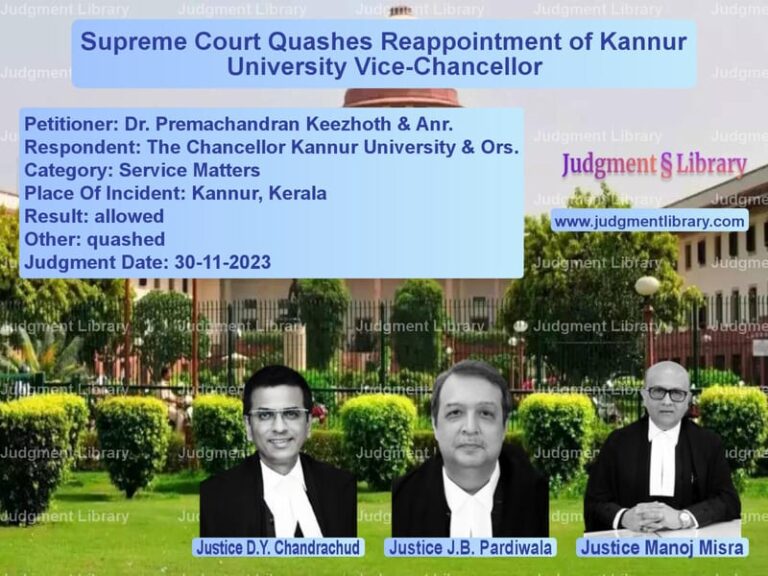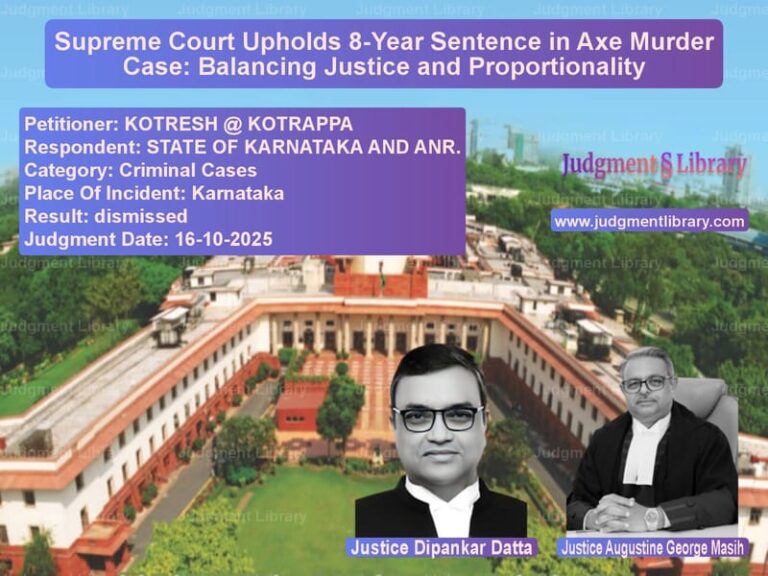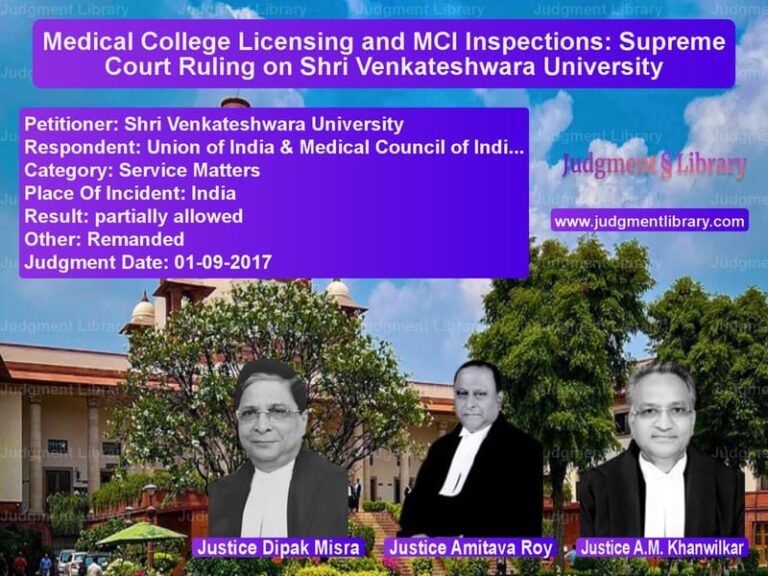Murder Conviction Reduced to Culpable Homicide: Supreme Court Ruling on Section 302 IPC
The Supreme Court of India, in the case of State of Karnataka vs. Yenkareddy & Ors., reviewed a criminal appeal concerning the conviction of multiple accused persons for murder. The case involved the attack and killing of a man due to past enmity. The Court ultimately modified the conviction from murder under Section 302 IPC to culpable homicide not amounting to murder under Section 304 Part-II IPC.
The ruling emphasizes the importance of assessing the intention behind a crime and considering mitigating factors before determining the appropriate punishment.
Background of the Case
The incident occurred on 29 January 1995, when the deceased, Siddaramreddy, went to his field with his wife, Annapoornama (PW-3), and daughter, Tayamma (PW-4). The accused, including Yenkareddy and others, allegedly formed an unlawful assembly and attacked Siddaramreddy with wooden clubs.
The trial court found:
- Accused No.1 guilty under Section 302 IPC (murder).
- Accused Nos. 2, 3, 4, 5, and 7 guilty under Section 302 IPC read with Section 149 IPC (unlawful assembly and common intention).
The trial court sentenced the accused to life imprisonment. However, the accused appealed to the Karnataka High Court.
High Court’s Ruling
The Karnataka High Court modified the trial court’s ruling:
- It acquitted Accused Nos. 4 and 5, citing a lack of specific evidence against them.
- It reduced the conviction of Accused Nos. 1, 2, 3, and 7 from Section 302 IPC to Section 304 Part-II IPC (culpable homicide not amounting to murder).
- The sentence was reduced to five years of imprisonment, with set-off for time already served.
The State of Karnataka appealed to the Supreme Court, arguing that the accused should have been convicted of murder under Section 302 IPC.
Arguments by the Appellant (State of Karnataka)
The prosecution argued that:
- The accused acted with premeditation and formed an unlawful assembly to kill Siddaramreddy.
- The nature of the attack was brutal and deliberate, warranting a conviction under Section 302 IPC.
- The High Court wrongly reduced the sentence and acquitted some accused despite the evidence.
Arguments by the Respondents (Accused)
The accused defended themselves, stating:
- There was no prior intention to kill Siddaramreddy.
- The attack was a result of a sudden quarrel, not premeditated murder.
- They used wooden clubs, not deadly weapons like knives or firearms.
- The reduced conviction was justified as per the nature of injuries and lack of prior planning.
Supreme Court’s Observations
The Supreme Court carefully reviewed the evidence and upheld the High Court’s decision, stating:
- “There was no clear evidence that the accused had common intention to commit murder.”
- “The use of wooden clubs indicates that the accused may not have intended to cause death but only bodily harm.”
- “The High Court’s finding that the crime falls under Section 304 Part-II IPC is reasonable.”
- “Since the incident occurred in 1995, further imprisonment of the accused is not justified at this distant point in time.”
Final Judgment
The Supreme Court dismissed the appeal and ruled:
- The acquittal of Accused Nos. 4 and 5 was upheld.
- The conviction of Accused Nos. 1, 2, 3, and 7 under Section 304 Part-II IPC was confirmed.
- The reduced sentence of five years imprisonment was upheld.
- The accused, having already served their sentence, were released.
Impact of the Judgment
This ruling reinforces key legal principles:
- Murder vs. Culpable Homicide: Courts must carefully assess the intention and circumstances before convicting under Section 302 IPC.
- Use of Weapons: The type of weapon used in a crime influences the degree of punishment.
- Sentencing Considerations: Long-pending cases may lead to reduced sentences based on time already served.
- Benefit of Doubt: If the prosecution fails to prove clear intent to kill, courts may opt for lesser punishments.
By reducing the conviction from murder to culpable homicide, the Supreme Court ensured that justice was delivered based on the facts and legal principles.
Petitioner Name: State of Karnataka.Respondent Name: Yenkareddy & Ors..Judgment By: Justice R. Banumathi, Justice Indira Banerjee.Place Of Incident: Karnataka.Judgment Date: 06-09-2018.
Don’t miss out on the full details! Download the complete judgment in PDF format below and gain valuable insights instantly!
Download Judgment: State of Karnataka vs Yenkareddy & Ors. Supreme Court of India Judgment Dated 06-09-2018.pdf
Direct Downlaod Judgment: Direct downlaod this Judgment
See all petitions in Murder Cases
See all petitions in Bail and Anticipatory Bail
See all petitions in Attempt to Murder Cases
See all petitions in Judgment by R. Banumathi
See all petitions in Judgment by Indira Banerjee
See all petitions in dismissed
See all petitions in Modified
See all petitions in supreme court of India judgments September 2018
See all petitions in 2018 judgments
See all posts in Criminal Cases Category
See all allowed petitions in Criminal Cases Category
See all Dismissed petitions in Criminal Cases Category
See all partially allowed petitions in Criminal Cases Category







